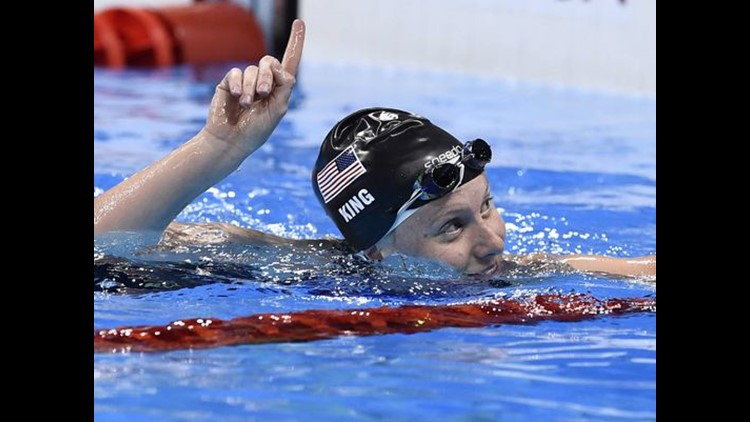With the wag of a finger and a cascade of boos, the months-long Russian doping controversy has come to life at the Olympic Aquatics Center.
The swimming venue has become the crossroads of a morality play that harkens back to the days of the Cold War. A 100-meter race between two breaststrokers has turned into a metaphor for the endless bickering between East and West. A battle of words and frog kicks has become the culmination of the growing antagonism between the Russian state-sponsored doping machine and those nations around the world that have spoken out forcefully against it.
The race itself Monday evening was a simple contest between Russian Yulia Efimova – the twice-banned 2012 Olympic bronze medalist and world champion who was suspended from these Olympic Games, then mysteriously brought back hours before she was to compete – and American Lilly King, who boldly spoke for many Olympic athletes in her open condemnation of Efimova’s presence here.
King, a 19-year-old swimmer at Indiana University, was the top qualifier by just two-hundredths of a second over Efimova Sunday, but that was hardly the story of the evening. Efimova and King engaged in a finger-wagging battle, and when King was asked about it, she pointedly did not back down.
“You know, you're shaking your finger No. 1 and you've been caught for drug cheating,” King said of Efimova to NBC. “I'm just not, you know, not a fan.”
Game on.
King is not alone. There’s never been much booing in swimming – except for this week when a Russian is announced on the pool deck. Efimova is by far the boo-birds’ biggest target. The reaction is especially intense from the sections of the arena where swimmers from other countries are sitting.
What exactly are they booing? It’s easy to get confused about who’s cheating in what these days, but here’s how to differentiate between Efimova and, say, disgraced cyclist Lance Armstrong.
Armstrong was not part of a state-sponsored doping program. Efimova is. Armstrong actively deceived his national drug-testing system. Efimova was a product of hers.
To put this in understandable terms, let’s take what the Russians did and see how it would look if it had happened in the United States:
The cheating would have been led by the Health and Human Services secretary, a member of President Obama’s cabinet, and would have included the U.S. Olympic Committee, the FBI or the CIA (or both) and the U.S. Anti-Doping Agency. It would have involved hundreds of U.S. athletes from all Olympic sports, winter and summer. It would have gone on for five years, and resulted in the outright stealing of dozens if not hundreds of medals and titles from clean athletes around the world who deserved them.
That’s the equivalent of what Russia did. And that’s why people are booing. For more than a generation, the story of swimming sadly has been intertwined with the story of steroids. You’ve heard of East Germany? China? Many swimmers from other countries who were not cheating lost out on the chance for a medal due to the performance-enhancing drug use of competitors from those nations, among others.
It was the rare voice that spoke up: Shirley Babashoff about the East Germans at the 1976 Montreal Olympics, Janet Evans about long-since disgraced Irish swimmer Michelle Smith at the 1996 Atlanta Games.
Babashoff had the courage to call out an East German team that was later found to have cheated in every race. But the news media of the day was wholly unprepared to identify or acknowledge the coming of the steroids era in sports and instead lamentably labeled Babashoff “Surly Shirley.”
It was a dreadful mistake that brings us to today, to a time in sports history when a young American breaststroker can follow in Babashoff's wake, with an entire generation of swimmers right by her side.



